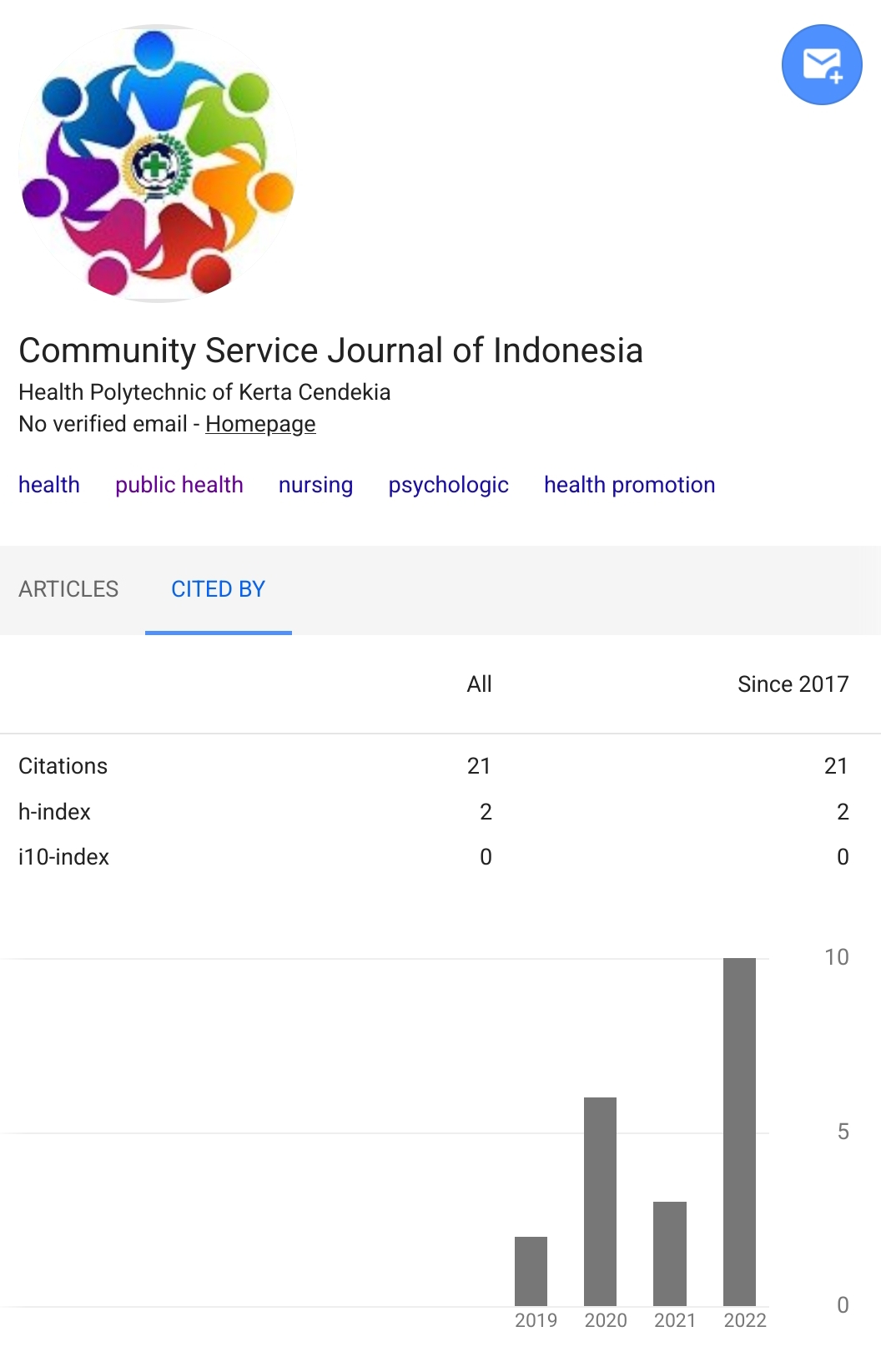PENA EMAS: A MODEL OF COMMUNITY EMPOWERMENT AND INDEPENDENT PARTICIPATION IN HANDLING STUNTING
Abstract
Various national efforts and programs have been launched to overcome the problem of stunting. However, the incidence of stunting still cannot be resolved optimally. One real effort to overcome the problem of stunting is to empower the community itself. In implementing this community empowerment activity, the PRA (Participatory Rural Appraisal) method is used because this method emphasizes the full involvement of partner communities in the program to be carried out. The three program priorities that will be implemented are providing additional food (PMT) to stunted toddlers and toddlers as well as pregnant women with chronic energy deficiency (KEK), increasing knowledge of partner communities through information communication and education (KIE) activities for target groups, and economic empowerment. family. The aim of implementing this activity is to provide assistance and trigger partner communities in overcoming the stunting problem that occurs. A total of 16 people attended the Ecoprint Workshop, and 15 people attended catfish cultivation training. The output targets targeted in implementing this activity include reducing the number of toddlers and toddlers with stunting, increasing hemoglobin levels and upper arm circumference in pregnant women who experience chronic energy deficiency, publishing articles in national journals, and documenting the implementation of community empowerment activities with stunting problems.References
Astuti DD, Adriani RB, Handayani TW. Pemberdayaan masyarakat dalam rangka stop generasi stunting. JMM (Jurnal Masy Mandiri). 2020;4(2):156–62 DOI: https://doi.org/10.30595/jppm.v4i2.5920
BKKBN BKDKBN. Buku Panduan Bapak Asuh Anak Stunting. 2022
Dasman H. Empat dampak stunting bagi anak dan negara Indonesia.Conversat. 2019;1
Dinkes Kab Mojokerto DKKM. METADATA STATISTIK VARIABEL dari Jumlah Balita dengan Stunting di Kabupaten Mojokerto[Internet].
Kabupaten Mojokerto; 2023. Available from:https://satudatapalapa.mojokert okab.go.id/dataset/a01256e2-28cb- 4dc5-bfc3- fdb9ef631d83/resource/6b1574c1- e4fb-4024-8b36- 1d49d790d7e3/download/ms-var- jumlah- balita-dengan-stunting-di- kabupaten-mojokerto.xlsx
Haryono M. Peran Pendidikan Dan Pemberdayaan Ekonomi Keluarga. Manajerial J Manaj dan Sist Inf. 2022;11(1):95–102 DOI: https://doi.org/10.17509/manajerial.v11i1.2127
Ifroh RH, Susanti R, Permana L, Noviasty R. Peran petugas promosi kesehatan dalam penggunaan audiovisual sebagai media komunikasi informasi dan edukasi. J Ilmu Kesehat Vol. 2019;7(2) DOI: https://doi.org/10.32831/jik.v7i2.202
Kemenkes RI KKRI. Hasil Survei Status Gizi Indonesia (SSGI) 2022. 2023
Kemenkes RI KKRI. Peraturan Menteri Kesehatan Republik Indonesia Nomor 2 Tahun 2020 Tentang Standar Antropometri Anak [Internet]. Jakarta; 2020. Available from: http://hukor.kemkes.go.id/uploads/pr oduk_hukum/PMK_No 2_Th_2020_ttg_Standar_Antr opometri_Anak.pdf
Kemenkes RI KKRI. Petunjuk Teknis PMT. Petunjuk Teknis PMT. 2017. 5–16 p
Maisyarah M, Salman S, Sianturi E, Widodo D, Djuwadi G, Simanjuntak RR, et al. DasarMedia Komunikasi, Informasi, Edukasi (KIE) Kesehatan. Yayasan Kita Menulis; 2021
Mediani HS. Predictors of stunting among children under five year of age in Indonesia: a scoping review.Glob J Health Sci. 2020;12(8):83 DOI: https://doi.org/10.5539/gjhs.v12n8p83
Mugianti S, Mulyadi A, Anam AK, Najah ZL. Faktor Penyebab Anak Stunting Usia 25-60 Bulan di Kecamatan Sukorejo Kota Blitar. J Ners dan Kebidanan (Journal Ners Midwifery). 2018;5(3):268–78 DOI: https://doi.org/10.26699/jnk.v5i3.ART.p268-278
Rahmadhita K. Permasalahan Stunting dan Pencegahannya. J Ilm Kesehat Sandi Husada.2020;9(1):225–9 DOI: https://doi.org/10.35816/jiskh.v11i1.253
Satriawan E. Strategi Nasional Percepatan Pencegahan Stunting 2018-2024 (National Strategy for Accelerating Stunting Prevention 2018-2024). Tim Nas Percepatan Penanggulangan Kemiskin Sekr Wakil Pres Republik Indones [Internet]. 2018;(November):1–32. Available from: http://tnp2k.go.id/filemanager/files/R akornis 2018/Sesi 1_01_RakorStuntingTNP2K_Stranas _22Nov2018.pdf
Ulfah IF, Nugroho AB. Menilik Tantangan Pembangunan Kesehatan di Indonesia: Faktor Penyebab Stunting di Kabupaten Jember. Sospol J Sos Polit. 2020;6(2):201–13 DOI: https://doi.org/10.22219/sospol.v6i2.12899
Wardoyo H. Stunted dan Stunting. 2021;(1):21–2. Available from: https://www.bkkbn.go.id/berita- stunted-dan-stunting
Copyright (c) 2023 Puteri Indah Dwipayanti, Vera Virgia, Kurnia Indriyanti Purnama Sari, Nur Chasanah, Riska Aprilia Wardani

This work is licensed under a Creative Commons Attribution-NonCommercial 4.0 International License.
Authors who publish with Community Service Journal of Indonesia agree to the following terms:
- Authors retain copyright licensed under a Creative Commons Attribution-NonCommercial 4.0 (CC BY-NC 4.0), which allows others to remix, tweak, and build upon the authors' work non-commercially, and although the others' new works must also acknowledge the authors and be non-commercial, they don't have to license their derivative works on the same terms.
- Authors are permitted and encouraged to post their work online (e.g., in institutional repositories or on their website) prior to and during the submission process, as it can lead to productive exchanges, as well as earlier and greater citation of published work (See The Effect of Open Access). Authors can archive pre-print and post-print or publisher's version/PDF.













